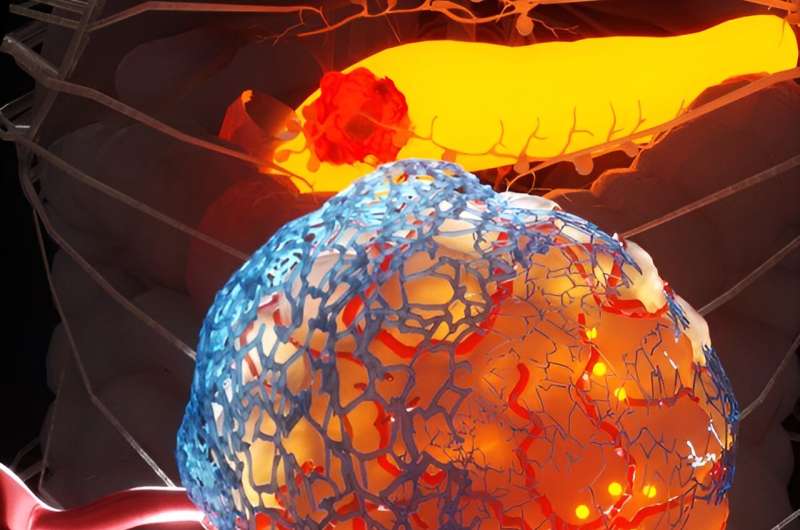This article has been reviewed according to Science X's editorial process and policies. Editors have highlighted the following attributes while ensuring the content's credibility:
fact-checked
peer-reviewed publication
trusted source
proofread
Drug that targets scar-like tissue in tumors shows promise for aggressive pancreatic cancer

Findings from the Garvan Institute of Medical Research reveal a new Australian drug that targets scar-like 'fibrotic' tissue within tumors shows promise for treating pancreatic ductal adenocarcinoma, one of the most aggressive forms of pancreatic cancer with a five-year survival rate of less than 10%.
The research in mouse models showed that when given in combination with chemotherapy, the drug PXS-5505 increased survival time by more than 35%, compared to chemotherapy treatment alone.
"The preclinical validation of this first-in-class anti-fibrotic drug marks a major milestone in our quest to overcome the significant challenges in treating pancreatic cancer and brings hope to patients and their families," says Associate Professor Thomas Cox, head of the Matrix & Metastasis Lab at Garvan and senior author of the study, published in the journal Nature Cancer.
Potential to increase cancer survival
Pancreatic cancer is often diagnosed at an advanced stage, which means that chemotherapy is often the only treatment option available. Many pancreatic cancers develop chemotherapy resistance soon after treatment starts, which contributes to the poor survival of patients. Part of this resistance is driven by tumor fibrosis—the formation of a mesh of scar tissue-like collagen—within and around pancreatic tumors that in turn reduces the effectiveness of chemotherapy drugs.
The new drug PXS-5505, developed by Sydney-based pharmaceutical research company Pharmaxis (ASX: PXS) and currently in Phase II clinical trials for the treatment of bone marrow cancer, works by blocking a family of enzymes that are critical for the deposition of collagen into the fibrotic tissue around tumors.
In collaboration with Pharmaxis, Garvan researchers found that the drug significantly reduced fibrosis in pancreatic tumors in mouse models.
The combination therapy also substantially reduced the spread of the cancer to other organs, such as the liver, by 45%.
"PXS-5505 returns the tumor microenvironment to a more 'normal' state by reducing fibrosis and decreasing tumor stiffness," explains Dr. Jessica Chitty, Senior Research Officer at Garvan and first author of the study. "This allows chemotherapy drugs to penetrate the tumors more easily, work more effectively, and destroy more cancer cells."
"PXS-5505 shows real potential to improve chemotherapy for patients," says Associate Professor Cox. "We are now in the process of progressing this work toward clinical trials that will evaluate this promising drug combination approach for pancreatic cancer patients."
"Pharmaxis has already seen very promising early results in a Phase II trial with patients that have the bone marrow cancer myelofibrosis," commented Gary Phillips, CEO of Pharmaxis.
"This groundbreaking research stems from a long collaboration with the team of high caliber researchers at the Garvan Institute and provides exciting new evidence that PXS-5505 may also have a role as a therapy to improve the effect of current chemotherapy drugs in solid tumors like pancreatic cancer and extending the life of patients."
More information: Jessica L. Chitty et al, A first-in-class pan-lysyl oxidase inhibitor impairs stromal remodeling and enhances gemcitabine response and survival in pancreatic cancer, Nature Cancer (2023). DOI: 10.1038/s43018-023-00614-y


















